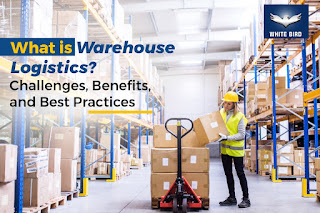When it comes to optimizing your supply chain and enhancing operational efficiency, choosing the right warehouse storage solution is crucial. Whether you're based in Northampton or anywhere else in the UK, understanding the variety of storage solutions available can significantly impact your warehousing and distribution services. Here’s a comprehensive guide to help you navigate through the different types of warehouse storage options.
1. Rack Storage
Rack storage is one of the most common and versatile solutions in warehouses. It allows for the efficient use of vertical space, enabling you to store a large number of pallets. In Northampton warehouses, rack storage is ideal for businesses needing to store bulk goods, seasonal items, or products that are frequently accessed. There are several types of rack systems, including:
- Selective Racking: Offers easy access to each pallet. Ideal for a wide range of products and is commonly used in Northampton warehouses.
- Drive-In Racking: Maximizes space by allowing forklifts to drive into the racking system. Perfect for high-density storage needs.
- Push-Back Racking: Allows pallets to be stored on carts that are pushed back along inclined rails. This system is great for high-density storage with easy access to the most recent stock.
2. Mezzanine Floors
Mezzanine floors are elevated platforms that create additional storage space without the need for major construction. They are an excellent choice for Wellingborough Warehouses looking to expand their storage capacity vertically. Mezzanines can be customized to suit various storage needs, including office space, pick and pack areas, or additional storage for inventory.
3. Pallet Racking
Pallet racking systems are essential for warehouses with large volumes of palletized goods. This storage solution is highly scalable, allowing businesses to adjust the configuration as needed. In the context of Northampton warehouses, pallet racking is ideal for businesses dealing with heavy, bulky items that require robust support structures.
4. Automated Storage and Retrieval Systems (AS/RS)
AS/RS systems are advanced solutions that automate the process of storing and retrieving goods. These systems use cranes, conveyors, and automated guided vehicles (AGVs) to move products efficiently. For companies looking to enhance their warehousing and distribution services UK, AS/RS can significantly reduce labor costs and improve inventory accuracy. Northampton warehouses equipped with AS/RS systems benefit from faster order fulfillment and reduced operational costs.
5. Drive-In/Drive-Through Racking
Drive-in and drive-through racking systems are designed for high-density storage of pallets. In drive-in racking, forklifts enter the racking system to place or retrieve pallets, while drive-through racking allows forklifts to drive through the racking system on both sides. These solutions are ideal for bulk storage of homogenous products and are commonly used in Northampton warehouses to maximize space utilization.
6. Dynamic Racking Systems
Dynamic racking systems, such as flow racks and gravity racks, are designed to facilitate the first-in, first-out (FIFO) inventory system. These systems use gravity to move products through the racks, making them perfect for perishable goods or items with expiration dates. For Northampton warehouses, implementing dynamic racking can enhance inventory turnover and reduce waste.
Conclusion
Choosing the right warehouse storage solution is essential for optimizing your operations and ensuring efficient warehousing and distribution services. Whether you’re considering Northampton warehouses or exploring solutions across the UK, understanding the different types of storage options available will help you make informed decisions that enhance your business's productivity and profitability.
For more information on Northampton Warehouses or to explore our warehousing and distribution services in the UK, contact us today. Let’s streamline your logistics and take your business to the next level!
%20(1).jpg)









